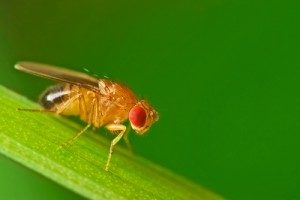Have you ever left peaches or melon ripening on the counter a little too long and then discovered a dark cloud of tiny insects flying around and crawling on them?
These annoying pests are known as fruit flies and they’re found anywhere that over-ripened fruit and vegetables are stored at room temperature.
Fruit flies are tiny, but easy to recognize: about 1/8 inch long, half the size of most house flies, light tan color with bright red, orange or black eyes (there are hundreds of different species).
Fruit flies have relatively short life cycles, going from egg to larvae to adult in a week. They can live another month or so after they reach the adult stage.
Although most people think of fruit flies as a nuisance rather than a health hazard, they can carry bacteria and other disease-producing organisms, contaminating the food they contact.


Fruit flies are attracted to rotting and/or moist organic matter and it’s easy for them to find sources of food in a kitchen:
- Overripe fruit or vegetables left on a counter
- Potatoes or onions rotting in a bin
- Garbage disposal that hasn’t been run
- Compost bin or trash can that hasn’t been emptied
- Fresh flowers
- Sticky, sugary spills
- Wet mops or sponges with food still clinging
To ensure that your Baltimore home remains free of fruit flies, keep a close eye on any produce that you store at room temperature and use it or refrigerate as soon as it’s ripe.
Empty trash and compost regularly, and scrub out the containers if they have any residual matter or stickiness remaining on them.
Run your garbage disposal every day.
Put dishes in the dishwasher immediately after you’re done eating; leaving food on the plates is like issuing an invitation for fruit flies to visit.
Since fruit flies like damp spots, you should also take care of any plumbing leaks under your sink. Repair or replace screens with holes or large gaps; these flies can sneak through very small crevices.

As a Home Protection Plan customer, if you’re not satisfied with our pest control service, we will service your home at no additional cost until your issue is solved or receive your money back from your last scheduled service.

Our treatment of fruit flies focuses on the identification and removal of their breeding grounds and food supplies. Without it, sticky traps and insecticides will be of little use.
Sanitation of breeding sites is by far the best method of getting rid of fruit flies. Bleach has little effect on fruit flies in drains – it’s better to physically remove the organic buildup and treat with a biological enzyme cleaner.
Looking to schedule a pest control service for your Baltimore home? Call us at 410-653-2121 or contact us online today for a professional consultation in Maryland.


